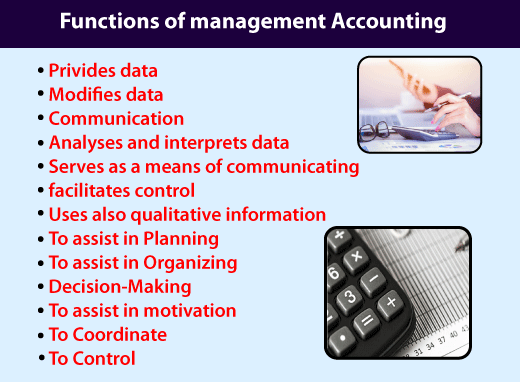Functions of Management AccountingManagement accounting prepares accounting information to assist the organization's management in planning and policy development, operational instructions, decision-making, resource utilization optimization, management disclosure, and secure asset support application of expertise, skills, and concepts. In a nutshell, management accounting is the processing and display of accounting and economic data to aid in analysing management performance, establishing plans, making comparisons, budgeting, forecasting, etc. Functions of Management Accounting
1. Forecasting and PlanningOne of the most significant responsibilities of management accounting is to supply the information and data needed to make short-term and long-term forecasts and plan the business's operations. Controlling personnel uses statistical techniques such as probability, correlation, regression trend analysis, budget and standard costing, capital budgeting, marginal costing, and cash flow statements. These are crucial instruments in the hands of management accountants for business planning. 2. OrganisingThe management accountant assists management in organizing the company's human and non-human resources by analysing various functions and assigning specific duties. It attempts to modernize the accounting and financial functions of the company. 3. CoordinatingManagement accountants improve the efficiency and profitability of their organizations by providing a variety of tools for coordination, such as budgeting, financial reporting, financial analysis, interpretation, etc. It assists management by coordinating costs and financial accounts, preparing budgets, setting standard costs, analysing cost variances, and exceptionally assisting management. 4. Controlling PerformanceThe management accountant aids in the control of the organization's performance by utilizing standard costing, budgetary control, accounting ratios, cash and funds flow statements, cost reduction programs, and evaluating capital expenditure proposals and return on investment. 5. Changes to the Data FunctionAnother beneficial function of management accounting is modifying raw accounting data. Following that, business people bid fairly on effectively employing these modified data in business management. Management accounting can be used to categorize every accounting item in several ways. Numerous accounting software programs can display sales or purchases or other accounting information based on a production level, area, season, country, age, or creditor or debtor quality. On the one hand, it will help establish the company's analytic approach, while on the other hand, it will be useful to examine every accounting item from various angles. 6. Financial Analysis and InterpretationThe management accountant analyses the data and presents it to the manager with comments and ideas in a non-technical way so that owners and executives can easily absorb and make decisions. 7. CommunicationThe management accountant creates several reports to communicate the findings to the manager, encourage employees to manage their work effectively, and help them make wise decisions. It also informs the outside world about the company's development through public accounts and returns. 8. Special StudiesThe management accountant strives to maximize the company's earnings by performing cost and economic studies regularly. Everyone attempts to establish the needs for long-term and short-term capital, recommend proper capitalization for the firm, and evaluate different capital expenditure ideas and their influence on the return and profits of the concern. 9. Business Asset ProtectionThe management accountant will charge for business asset protection. He is responsible for ensuring sufficient funding for the repair, maintenance, and replacement of fixed assets not to affect the company's production capacity. He is also responsible for ensuring that the company's assets are appropriately guaranteed. 10. Tax policyTax policies and procedures are the responsibility of the management accountant. He will make the reports necessary by various authorities available. He will implement suitable taxation provisions. He is to ensure that quarterly payments of prepaid taxes are made on time to avoid overdue interest payments, as required by the Income Tax Act. 11. Various functionsIn addition to the above functions, the management accountant provides valuable information to various functional authorities and provides accounting information and advice necessary for price and price determination, strategic seasons, temporary production suspension, etc. Make decisions, make or assist in purchasing decisions, exchange decisions, expand or close specific areas or departments, etc. 12. Decision makingManagement accounting facilitates the transmission of financial information to management for decision-making. Management accounting also includes:
13. AccountabilityManagement accounting places a high value on accountability by utilizing effective performance measurement. Responsibility accounting is accomplished by evaluating managers' performance in charge of their business units while taking into account issues beyond their control or influence. Management accounting helps you assign accountability to achieve your business goals by creating a target set of strategic business units and departments. 14. EvaluationThe management accountant must assess the efficacy of the policies, organizational structure, and processes to achieve the goals. To do so, he must consult with functional managers and top executives. 15. AdvisingAccountant must advise management to improve operational performance. 16. Tax AdministrationA company entity must pay value-added tax, income tax, and other taxes to the local, state, and federal governments. In this regard, the management accountant is expected to pay taxes and keep accounting records as needed. 17. Reporting to the GovernmentAccountant will be responsible for supervising all statements and returns that must be filed regularly and on time to the Government. 18. Evaluation of External EffectsPolicy changes in the state and federal governments are possible. Existing laws are subject to change at any time. These policy changes and revisions affect the achievement of corporate goals. The management accountant must determine the magnitude of the impact. 19. Economic EvaluationThe central government publishes the country's economic situation regularly. The management accountant is responsible for performing economic analysis and determining the impact of economic conditions on business operations. In this regard, he can produce a report and present it to top management and their opinions. 20. Property protectionThis task is performed by maintaining a separate fixed asset register for each type of fixed asset. Furthermore, everyone can define the norms and regulations for each form of a fixed asset. Anyone can ensure all kinds of tangible assets.
Next TopicObjectives of Management Accounting
|
 For Videos Join Our Youtube Channel: Join Now
For Videos Join Our Youtube Channel: Join Now
Feedback
- Send your Feedback to [email protected]
Help Others, Please Share










